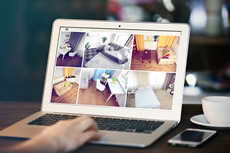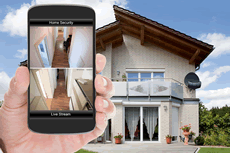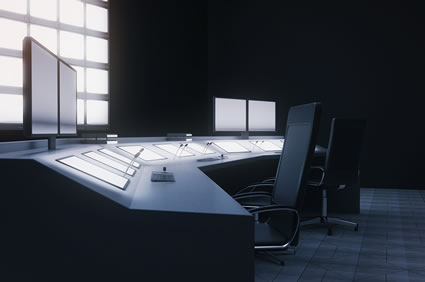 |
Security Alarm and Camera Systems |
Security Camera Installation and Monitoring
This is probably one of the best security investments a business owner can make. Liability claims are at an all time high. Nothing proves your case better than a live recording of the incident(s) as its occurred. Not only is the system great from crime prevention, but often video proof saves business owners' ton of money by avoiding litigation. Once a recording is produced, the party claiming damage usually drops the claim. So, let's consider the costs of both. The average hourly rate of an alarm installation company... $100.00 hr. The average attorney's hourly rate... $300.00. The alarm installer will probably need 5 to 8 hours to install a medium sized alarm or video system. The attorney might need to fight your case for months. The math is simple. Protect yourself and your business with an in-house (CCTV) monitoring system. Reduce your security risks, increase safety, and protect your assets.
Who'll be monitoring my camera's? After your video system installation you may want to consider remote security video monitoring, in essence hiring a security guard to monitor your business 24/7 from a remote location, and one that has the capability of dispatching law enforcement or notifying the business owner of a safety or security concern. This option is best for medium sized and high profile retail facilities which may not necessarily have the staffing required for in-house security monitoring. The price will range depending on the service need, but will most often cost less than hiring your own monitoring agent. Most small business owners can install the video system and place the video screen in an area which they are most often at, thereby eliminating the need for an outside monitoring company.
Alarm System Installation and Monitoring These systems have pretty much been perfected. We've been installing and monitoring alarm systems since the late 1800's. Today’s technology however is bit more advanced. Modern systems allow us to monitor alarms remotely, and allow access to a wide range of controls from unlocking gates and doors to controlling indoor and outdoor lighting. They function as great deterrents to crime and are not expensive to purchase or install. In fact most often, alarm monitoring companies will offer a free alarm system and installation when signing a 2 or 3 year monitoring contract. Alarm features vary greatly, so do research on the type of system best suited for your home or business. Things to consider include whether or not you want the alarm sensors hard wired or wireless, do you want the system to connect to the monitoring company via telephone line or cell service such as Verizon or AT&T (which allows the alarm system to continue communicating with the monitoring company if the telephone line has been disconnected), and whether you need the system to be tied in to your whole-home or business security wiring. You may also decide to simply pay for an alarm system and installation yourself, and bypass alarm monitoring. It should be noted though that most insurance companies offer a rate reduction when an alarm system is monitored and that usually offsets the cost of the monitoring service. Monitoring services typically range between $20.00 to $100.00 per month depending on needed features and the resources required to fulfill them. |
Installation and Equipment

Hiring an experienced installer is best
Studies have shown that 92% of alarm and video system failures occur as a result of installation problems. No matter the quality of the equipment being installed, if the technician doesn't take the time to install the system carefully and properly, the reliability of the equipment diminishes significantly. You should expect an experienced tech to use the most time tested and proven installation techniques, assuring the highest performance and reliability rates possible for their clients.
As far as equipment, you'll need to decide on whether you need an alarm system or video surveillance system, or both. The need will be based on a few factors, mainly which will provide the best protection for your family, property, customers and/or personnel. If installing a video surveillance system you'll need to consider the types of cameras and video management software (VPS) to use. Surveillance cameras include vandal proof cameras, HD cameras, PTZ (these can be controlled remotely), and even cameras equipped with thermal imaging.
|
|
Alarm and Video Monitoring

Someone is watching your property 24/7
...luckily it's the good guys. Specialized security agents can monitor your property remotely, 7 days a week and 24 hours a day. Agents may be asked to contact you and/or law enforcement upon verification of suspicious activity or a medical emergency. The company you hire to monitor your surveillance cameras should plan a comprehensive strategy designed to increase security and safety.
Critical checkpoints must be identified and auditing regularly. Each audit can be graded with either a pass/fail and details of the audit made available for future review. Your property might have hot spots, where trouble most often occurs. These areas should be given priority and monitored more closely. The right monitoring company will go through the details. Monitoring services are ideal for retail stores, shopping centers, and locations where employees handle large amounts of cash and/or valuable contents. A monitoring company may use one agent to monitor more than one location thereby reducing its overhead and allowing for cost effective consumer pricing.
|
|
Watching Cameras on a PC

VMS & NVR tools allow remote viewing
One of the most favored features of newer video surveillance systems is the ability to view your cameras remotely on a PC, even if you're half-way around the world. If you have access to an internet connection, your IP cameras combined with video management software (VMS) and a PC will allow you to monitor your security system, alerting you to unexpected motion and/or audio.
Network video recorders (NVR) are alternate equipment for recording security video and monitoring cameras remotely. These systems are comprised of hardware only and feature stand alone recording devices, as to eliminate the need of a PC. Using a network video recorder is similar to that of a VMS, except no personal computer is required. The trade-off is some advanced features available only on a VMS might not be available, but the unit can be locked away in a safe and secure location without taking your PC with it.
Both VMS and NVR systems allow for video recording and should have the ability to download and edit video. VMS usually allows for online backup also, while NVRs may only record locally. |
|
Smart Device Access

Accessing cameras on a mobile device
Most VMS software companies offer counterpart mobile apps, for both Iphone and Android, which make viewing IP camera systems on a smartphone simple. This is the best route to go if planning on accessing your security cameras from a mobile device. The login and password you use to access your camera system on a PC will also allow you access to your cameras on a smartphone. The app may not contain all the features of its desktop version, but will provide the basics as far as viewing, editing, and downloading video recordings, with or without sound.
What if you don't have VMS? More recent NVR systems have the ability to stream live video as well. NVR systems however may require the use of a third-party mobile app in order to access your camera system's network. The system hardware and third-party app may have compatibility issues and not allow your smartphone to access all of your NVR system's features.
So in conclusion, both systems will allow viewing cameras on a smart device. Mainly you'll need to ask yourself if you use the computer which you have the VMS installed on for any other purpose but surveillance and monitoring. If you do, more than likely, you will not be able to lock the PC in a secure location. If it is a priority for you to have the recording device locked away, you'll prefer to purchase and install a NVR system, which does not require a desktop or laptop PC to record, and is a stand alone unit. |
|
|









